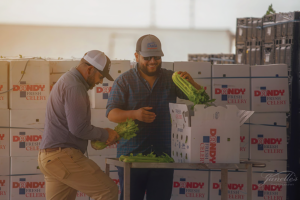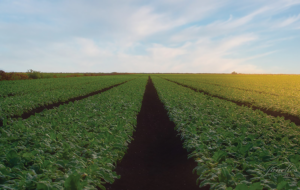Duda Farm Fresh Foods closes in on century of sustainability
When Andrew Duda took his first crop of celery to market in 1926, he probably wasn’t thinking of sustainability goals.
But sustainable practices have kept the company he founded, Duda Farm Fresh Foods, growing produce — including its legacy celery crop — for 97 years. Now, the company is ramping up that environmentally friendly focus by honing in on recycling goals as it nears its centennial.

In 2019, the company took an in- depth look at sustainability. Working with produce industry consultant Measure to Improve, Duda Farm Fresh Foods identified sustainable packaging characteristics and created a data collection process for all primary, secondary and tertiary packaging.
The company, which farms thousands of acres in Georgia, Florida, Michigan, Arizona and California and produces nearly 33% of the celery grown in the U.S., also established the Growing Greener Generation team. Staff from operations on the East and West Coasts helped collect data to establish the company’s Sustainable Packaging Baseline in 2021.
BY THE NUMBERS
The company found that while 98% of its secondary and tertiary packaging is reusable or recyclable, 50% of its primary packaging (the packaging that goes home with the consumer) fits that category.
“In 2019, we saw a lot of customers coming to us with their own sustainability goals that really centered around packaging, and we had to look inward to say, OK, we have to help our customers meet these goals as well as our own in being good stewards of the environment,” said Nichole Towell, senior director of marketing and packaging procurement at Duda Farm Fresh Foods.
With baseline data established, the company turned its focus to four recycling goals:
- Labeling 100% of its primary packaging with its How2Recycle label by 2025.
- Achieving 90% recyclable, reusable or industrial compostable primary packaging by 2025.
- Having 20% post-consumer recycled content in primary packaging by 2030.
- Reducing 20% of virgin plastic in primary packaging by 2030.
“We’re looking at where we can make the highest impact,” Towell said. “So we looked at the highest movers, or what we’re shipping the most of, and that’s where we started.”

The company is working with its primary packaging vendors to test new substrates and find ways to reduce plastic use while also ensuring that food safety and shelf-life performance is not affected, Towell said.
“We’re still in the heavy trialing phase at the moment. We have over 1,200 different packaging components, so that’s a large undertaking as a company,” she said. “It’s not something we can do overnight. It’s a lot of intensive, serious work, because we also have to make sure that it (the packaging) will still perform well.”
AN ONGOING EFFORT
Duda Farm Fresh Foods is taking other steps to help keep Andrew Duda’s long- ago vision viable.
The company is investigating automated harvesting and tries to maximize energy efficiency — Towell said solar panels power 40% of the company’s Oxnard, California facility — while employing measures such as drip irrigation and water sensors.
From that first celery crop harvested 97 years ago, Duda Farm Fresh Foods now breeds around 150 patented varieties, Towell said. The company also produces broccoli, cauliflower, citrus, lettuce, radishes and sweet corn.
“Farming has always been sustainable. We have to preserve the ground to keep getting the crops,” Towell said. “We wouldn’t have been able to farm for 100 years if we didn’t take care of what we had.”







